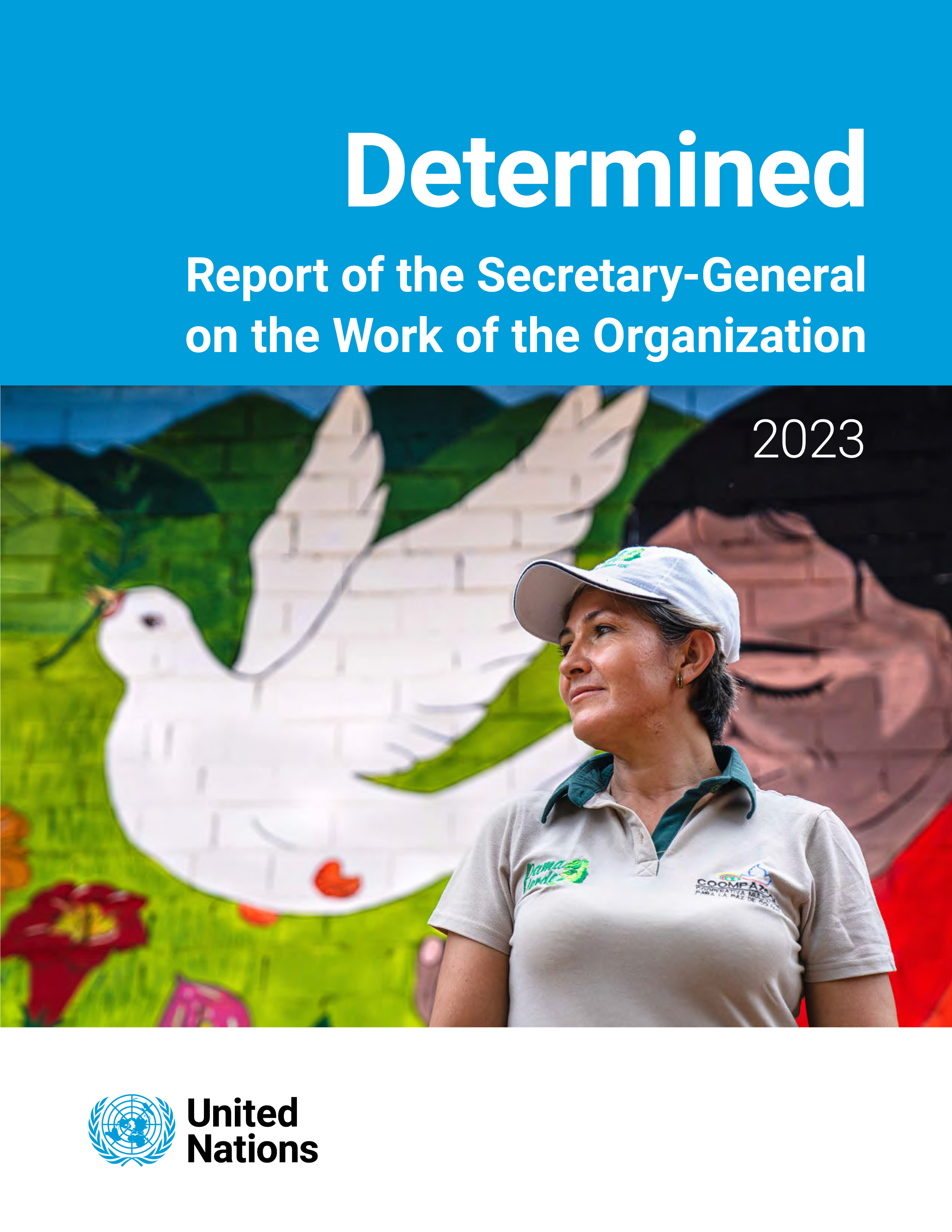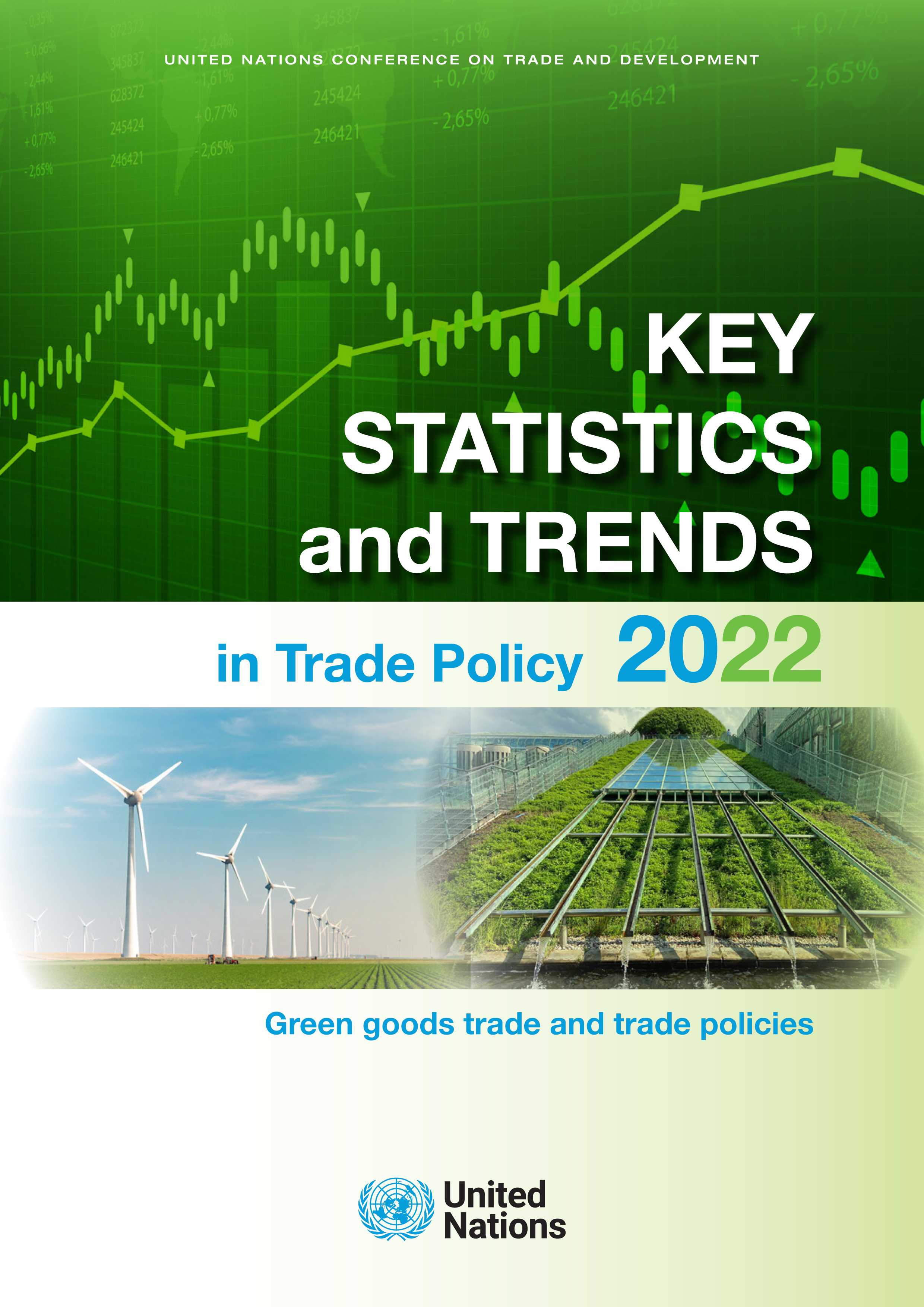- الصفحة الرئيسية
- Collections
- YPP Economic Affairs
YPP Economic Affairs

Collection Contents
1 - 20 من 22 النتائج
-
-
Report of the Secretary-General on the Work of the Organization 2023
Determined
More Lessمؤلف: United NationsThe Report of the Secretary-General on the Work of the Organization (A/78/1) is issued in response to Article 98 of the UN Charter and highlights how the UN Secretariat translates resources into impact. The Report covers nine sections: (i) promotion of sustained economic growth and sustainable development; (ii) maintenance of international peace and security; (iii) development in Africa; (iv) promotion of human rights; (v) effective coordination of humanitarian assistance; (vi) promotion of justice and international law; (vii) disarmament; (viii) drug control, crime prevention and combating international terrorism; and (ix) effective functioning of the Organization. The e-book for this publication has been converted into an accessible format for the visually impaired and people with print reading disabilities. It is fully compatible with leading screen-reader technologies such as JAWS and NVDA.
-
-
-
Key Statistics and Trends in Trade Policy 2022
Green Goods Trade and Trade Policies
More LessKey Statistics and Trends in Trade Policy is a yearly publication of the Trade Analysis Branch, Division on International Trade and Commodities (DITC), UNCTAD secretariat. The main purpose of this publication is to inform on the use and effects of a wide range of trade policies influencing international trade. The series is part of a larger effort by UNCTAD to analyze trade-related issues of particular importance to developing countries in terms of their participation in the international trading system.
-
-
-
World Investment Report 2023
Investing in Sustainable Energy for All
More LessThe World Investment Report 2023 provides the latest trends and prospects for foreign direct investment. It documents a challenging year for cross-border investment flows, looking at greenfield investment in industry, project finance in infrastructure, and international production activities of the largest multinationals. Dedicated sections provide data on international investment in the SDGs and in sustainable energy. The Report further reviews recent policy developments, including trends in national investment policy measures and international investment agreements. It presents an overview of investment policy measures aimed at supporting the energy transition. The Report also documents sustainability trends in global capital markets, including sustainability-linked financial products, sustainable stock exchanges, institutional investor commitments and financial regulations – all with a special focus on the mobilization of funds for the energy transition. Finally, the theme chapter of the Report discusses ways and means to increase international private sector investment – in particular foreign direct investment and international project finance – in the energy sector in developing countries, taking into account both the energy transition imperative and SDG7 on affordable and reliable access to energy for all.
-
-
-
COVID-19 Recovery Action Plan for Informal Settlements in the ECE Region
More LessThe COVID-19 Recovery Action Plan for Informal Settlements in the UNECE Region is dealing with both – the new challenges, created by COVID-19, and the pre-existing ones, while also addressing the achievement of the Sustainable Development Goals (SDGs). This Recovery Action Plan, targeted at national and local governments in the ECE region, provides an extensive list of goals, targets, and actions that can be advanced by governments, local authorities, residents, community leaders, non-governmental organizations, and other stakeholders to help mitigate and/or prevent the COVID-19 pandemic spread. It is also designed to help build back better to achieve greater resilience against future pandemic risks while simultaneously helping to achieve the Goals of the 2030 Agenda for Sustainable Development, with a particular focus on SDG 11 on sustainable cities and human settlements.
-
-
-
Key Statistics and Trends in International Trade 2022
The Remarkable Trade Rebound of 2021 and 2022
More LessTrade trends during the last three years have been greatly influenced by the COVID-19 pandemic. During 2020, the economic disruptions brought about by COVID-19 resulted in a decline of international trade in goods and services. However, as global demand resumed, international trade strongly rebounded in 2021 and further increased during 2022. Overall, the value of global trade is expected to be about 25 per cent higher in 2022 than it was in 2019. A substantial part of the increase in the value of trade during the last two years can be explained by rising commodity prices and more recently by general inflation. Trade volumes grew to a smaller extent. Even so, the steady increase in the volume of international trade since early 2021 indicates a robust global demand for traded goods.
-
-
-
Measuring the Value of E-Commerce
More LessMeasuring the monetary value of e-commerce transactions has has become increasingly important, not least as a result of the COVID-19 pandemic during which a shift to making online purchases supported economic resilience. Nevertheless, there is very limited information available and better statistics on the value of e-commerce are needed to understand its economic role and contributions to GDP, employment and development, as well as for evidence-based policymaking. Because of this, UNCTAD member States have indicated that developing guidance and support on measuring e-commerce is a key priority. This report describes the current situation regarding measures of the value of e-commerce, including cross-border e commerce, for various economies which have statistics available. The focus is on e-commerce sales by businesses, which is the main component of e-commerce as a whole, giving a view of measurement practices. It thereby provides a foundation for the next step in efforts to measure e-commerce, serving as the basis for a task group of delegates from interested countries and international organizations that will work to develop statistical guidelines for measuring the value of e-commerce sales and purchases.
-
-
-
Trade and Environment Review 2023
Building a Sustainable and Resilient Ocean Economy Beyond 2030
More LessThis edition examines the current and emerging cross-cutting role of the ocean in advancing economic growth, social inclusion and environmental sustainability. It builds on the discussions and outcomes of the Fourth United Nations Oceans Forum on trade-related aspects of SDG 14, life below water, which took place in Geneva from 6 to 8 April 2022. The Review examines and provides an analysis of several key and emerging topics for the ocean economy, including the seaweed sector as a lever for a sustainable economic recovery; fisheries subsidies and non-tariff measures (NTMs); the decarbonization of shipping and maritime supply chains; and plastic litter and other ocean waste challenges. It explores these issues, identifies the main opportunities and challenges and concludes by offering a bottom-up menu of action-oriented policy recommendations for Small Island Developing States (SIDS) and coastal developing countries. It calls for a “Blue Deal” on trade and finance to accelerate the implementation of SDG 14 and identify practical yet far-reaching development paths towards a sustainable, resilient and inclusive ocean economy by 2030 and beyond.
-
-
-
Reforms to the International Financial Architecture
Our Common Agenda Policy Brief 6
More LessThe present policy brief elaborates on the ideas first proposed in Our Common Agenda, taking into account subsequent guidance from Member States and over one year of intergovernmental and multi-stakeholder consultations, and rooted in the purposes and the principles of the Charter of the United Nations, the Universal Declaration of Human Rights and other international instruments. The international financial architecture should be structured to proactively support the implementation of the Sustainable Development Goals and the realization of human rights. The only way to facilitate such a structure is through ambitious reform, starting with more inclusive, representative and, ultimately, more effective global economic governance. The brief sets out action-oriented recommendations for reforming the international financial and tax architecture in six areas - Global economic governance; Debt relief and the cost of sovereign borrowing; International public finance; The global financial safety net; Policy and regulatory frameworks; Global tax architecture for equitable and inclusive sustainable development. This is the sixth of the Summit of the Future Policy Briefs.
-
-
-
Valuing What Counts: Framework to Progress Beyond Gross Domestic Product
Our Common Agenda Policy Brief 4
More LessThe challenges that we face can be addressed only through stronger international cooperation. The Summit of the Future in 2024 is an opportunity to agree on multilateral solutions for a better tomorrow, strengthening global governance for both present and future generations. In the 2030 Agenda for Sustainable Development and Our Common Agenda, it is recognized that a harmful anachronism exists at the heart of global policymaking, which is that our economic models and measurements overlook many aspects that sustain life and contribute to human well-being, while perversely placing disproportionate value on activities that deplete the planet. The intention of the proposals presented in the present policy brief is not to replace gross domestic product but to outline a path to develop complementary metrics in which what matters to people, the planet and the future is more fully recognized. This is the fourth of the Summit of the Future Policy Briefs.
-
-
-
Tackling the Sustainability Reporting Challenge: A Policy Guide
More LessThis publication has been prepared by UNCTAD-ISAR to support countries in their efforts to strengthen their national sustainability reporting infrastructure to keep up with international changes and promote sustainable finance and development. It contains different approaches, best practices, and examples from which policymakers and other interested stakeholders can choose when establishing or strengthening the regulatory, institutional, and human capacity components of the reporting infrastructure.
-
-
-
Crypto Assets and Central Bank Digital Currencies: Potential Implications for Developing Countries
More LessThis study provides an accessible, yet academically informed, discussion of main implications of crypto assets for developing countries. It asks four main questions: (i) what are the trends and drivers of crypto adoption, and which developing countries have been concerned the most; (ii) what do the economics of crypto assets imply for the ease of payments, financial inclusion, privacy, illicit financial flows, and currency substitution, as well as the architecture of the international monetary system (IMS); (iii) how can regulation shape the evolution of crypto adoption and what solutions can Central Bank Digital Currencies (CBDCs) and fast retail payment system provide; and (iv) are the monetary, financial and payments systems in developing countries ripe for embracing crypto assets?
-
-
-
Economic Governance Report I: Institutional Architecture to Address Illicit Financial Flows
More LessThis premier Economic Governance Report (EGR I) assesses the institutional architecture pledged by African governments for blocking illicit financial flows (IFFs) and recommends initiatives to strengthen it. The report’s findings indicate that IFFs continue to thrive, though African countries have tried to establish dedicated institutional frameworks for combatting them. The IFFs include corruption, money laundering, trade mis-invoicing to move money illicitly, and tax fraud (including corporate tax dodging). The report encourages more inter-agency collaboration, coordinated reporting, the removal of duplicated and competing mandates, and consistent political support for institutional reforms to combat IFFs. The report suggested that the African countries that are parties to international conventions on corruption should fully implement and align all national laws governing anti-corruption agencies. Anti-corruption laws should expressly cover IFFs. African countries should also strengthen the powers and independence of anti-corruption agencies to effectively address corruption, money laundering, trade-related IFFs, and tax-motivated IFFs. They should integrate data systems across all economic channels—central banks, customs authorities, other tax authorities, registries of companies, security exchange commissions, and commercial and non-banking financial institutions—to support tracking of corrupt transactions and the movement of corrupt proceeds.
-
-
-
eTrade for Women: Fostering Women Entrepreneurship in the Digital Economy
Insights from UNCTAD’s eTrade for Women Advocates 2019–2021 Cohort
More LessBuilding on the experience of UNCTAD’s eTrade for Women initiative, and more specifically on the first cohort of eTrade for Women Advocates, this paper reviews the main obstacles that women digital entrepreneurs encounter in developing countries. It sheds lights on the entrepreneurial paths of the Advocates, who have been at the forefront of the digital transformation in their respective regions, and highlights some of the factors that have been instrumental to their success as business leaders. It also explores actionable measures that could be put in place to help more women follow in the footsteps of the Advocates to grow successful digital businesses and be influential players in the digital economy.
-
-
-
SDG Pulse 2022
UNCTAD Takes the Pulse of the SDGs
More LessSDG pulse provides quantitative assessments of progress with the 2030 Agenda through both a selection of official SDG indicators as well as complementary data and statistics. It also presents recent conceptual and methodological developments regarding SDG indicators of which UNCTAD is the custodian. It has become UNCTAD’s reference publication in mapping the organization’s work with the SDGs, not only from an analytical perspective but also in terms of technical cooperation and capacity development. This year’s edition particularly focuses on the “two-speed recovery” from the pandemic which manifests through trade, finance and investment, investigates the issue of inclusive growth with UNCTAD’s new composite indices and provides some prospects on economic and social repercussions of the war in Ukraine.
-
-
-
World Economic Situation and Prospects 2023
More LessThe world continues to confront multiple, inter-connected crises. Amid a slow recovery from the impact of the COVID-19 pandemic, the world is facing a food and energy crisis exacerbated by the war in Ukraine with record high inflation unleashing a cost-of-living crisis. Developing countries are in trouble over the costs of imports and debt servicing, and a climate crisis continues to wreak havoc in the most vulnerable countries and populations. Amid monetary tightening, subdued consumption, and private investments, judicious government spending will remain critical for steering economic recovery worldwide. The World Economic Situation and Prospects 2023 will underscore the imperative of supportive and accommodative fiscal measures to lift growth and accelerate SDG progress.
-
-
-
UNCTAD Handbook of Statistics 2022
More LessThe UNCTAD Handbook of Statistics was first launched in 1967. Over the past 50 years, the handbook has evolved to incorporate new statistics and ensure that readers have access to the best possible information available. The 2021 edition of the Handbook continues in this tradition of excellence and innovation. As in previous years, this edition showcases 'nowcasted' estimates for total merchandised trade, total services trade and GDP. This publication provides a wide range of statistics and indicators relevant to the analysis of international trade, investment, and development.
-
-
-
The Least Developed Countries Report 2022
The Low-carbon Transition and Its Daunting Implications for Structural Transformation
More LessLDCs, which bear the least historical responsibility for climate change, are on the front lines of the climate crisis. The Report highlights the development strategies and policies which they need to enact to reach the ambitious objectives to which they have committed, and the painful trade-offs between climate action and accelerated progress towards fulfilling their right to development they will need to navigate in the challenging international economic and environmental context. Nowhere is the need for a “Just energy transition” starker than in the LDCs but the Report shows that despite this harsh reality, international support for LDC adaptation and sustainable development has fallen remarkably short of what is needed, both in terms of climate finance and of access to clean technologies. The Reports calls on the international community to be mindful of the institutional and capacity constraints that create scope for maladaptation in LDCs and to enhance targeted assistance to LDCs in line with their need for special and differential treatment.
-
-
-
The Sustainable Development Goals Report 2022
More LessThe Sustainable Development Goals Report 2022 presents how far we have come towards reaching the 17 Sustainable Development Goals (SDGs). This seventh edition of the annual report also looks at the trends since 2015 and impact of COVID-19 on the progress. It uses the latest available data and inputs from custodian agencies of the United Nations system other international agencies and is prepared by the Statistics Division of the Department of Economic and Social Affairs.
-
-
-
The Essential UN
More Lessمؤلف: United NationsAs the world’s only truly universal global organization, the United Nations has become the foremost forum to address issues that transcend national boundaries and cannot be resolved by any one country acting alone. This authoritative reference provides a comprehensive introduction and overview of the work of the UN in key areas of international peace and security, economic and social development, human rights, and humanitarian action.
-
-
-
Human Development Report
More LessHuman Development Reports (HDRs) have been released most years since 1990 and have explored different themes through the human development approach. They have had an extensive influence on development debate worldwide. The reports, produced by the Human Development Report Office for the United Nations Development Programme (UNDP), are ensured of editorial independence by the United Nation’s General Assembly
-


















